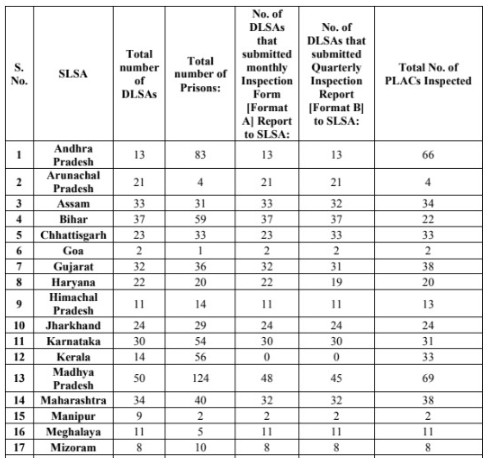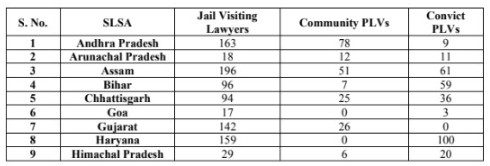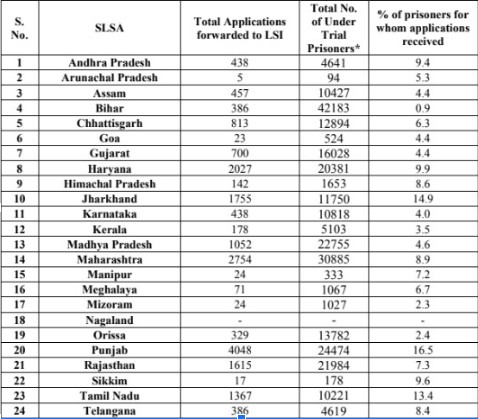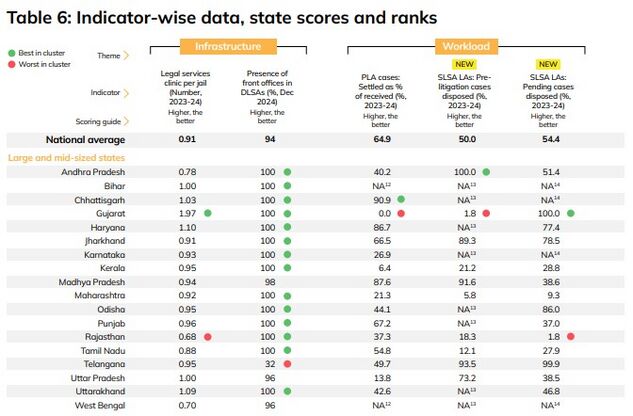Prison Legal Aid Clinics
What is Prison Legal Aid Clinic
A "prison legal aid clinic" is a legal aid program or facility established within a prison or jail to provide legal assistance to inmates, particularly those who cannot afford legal representation or are unfamiliar with the legal system. These clinics offer basic legal services such as advice, assistance with paperwork, and referrals to lawyers or other legal professionals. Section 12(g), The Legal Services Authorities Act, 1987 states that all ‘persons in custody’ are entitled to free legal aid.
Official Definition of Prison Legal Aid Clinic
Legal Aid Clinic as defined in legislation
National Legal Services (Legal Service Clinics) Authority Act 2011
Section 3(b) of the National Legal Services (Legal Service Clinics) Authority Act 2011 talks about establishment of legal aid clinics in jails, educational institutions, community centres, protection homes, Courts, juvenile justice boards and other areas, especially, where the people face geographical, social and other barriers for access -to the legal services institutions.
Legal provisions relating to Prison Legal Aid Clinic
NALSA Standard Operating Procedures (SOP) on Access to Legal Aid Services to Prisoners and Functioning of Prison Legal Aid Clinics, 2022
The primary objective of the SOP is to provide meaningful, efficient, and effective legal services to prisoners. It emphasizes that PLACs should not only cater to inmates who have opted for legal aid but also proactively ensure that no prisoner is without legal representation at any stage of the criminal proceedings. Additionally, PLACs are tasked with bridging the information gap between prisoners and courts, facilitating communication between inmates and their lawyers, and addressing grievances by directing them to appropriate authorities through the District Legal Services Authority (DLSA).
The SOP mandates the establishment of a PLAC within every prison under the jurisdiction of the DLSA. These clinics should be located in accessible areas within the prison premises to ensure prisoners can easily reach them. Each PLAC must be equipped with essential infrastructure, including furniture, computers with internet access, printers, and a collection of basic law books in English and the local language. Information about the clinic's timings, as well as the names and schedules of Jail Visiting Lawyers (JVLs) and Para Legal Volunteers (PLVs), should be prominently displayed to keep inmates informed.
PLACs serve as the primary point of contact for prisoners seeking legal assistance. Their responsibilities include ensuring that no inmate is without legal representation at any stage of the criminal proceedings, bridging the information gap between prisoners and the courts, facilitating communication between inmates and their legal representatives, and addressing the special needs of vulnerable groups such as women, juveniles, and mentally ill prisoners. Additionally, PLACs act as grievance redressal centers, directing inmates' concerns to appropriate authorities through the DLSA.
A crucial aspect of the SOP is the integration of PLACs with various Legal Services Authorities. This includes collaboration with State Legal Services Authorities (SLSAs), District Legal Services Authorities (DLSAs), and Taluk Legal Services Committees. Such integration facilitates the seamless provision of legal aid, ensuring that prisoners' applications are processed efficiently and that they receive timely legal representation.
Functions of Prison Legal Aid Clinics (PLAC)
According to the NALSA SOP of 2022 on page 32 of the Framework for strengthening the functioning of the Prison Legal Aid Clinics, the functions of the PLAC are enumerated as follows:
- To ensure that no person is without legal representation at any stage of their criminal proceeding and to generate awareness for the same
- To bridge any gap between the prisoners and the court in terms of information
- To help facilitate communication amongst the prisoners and lawyers, whether its through legal aid or a privately hired lawyer
- To ensure that no prisoner is detained unnecessarily
- To ensure that the needs of the vulnerable groups are addressed (eg: women, mentally ill, foreigners, young offenders,etc.)
- To collaborate with the local authorities, universities, academic institutions,etc to strengthen the provision of legal services to prisoners
- To act as the One Stop Centre(OSC) to raise grievances by prisoners and help in directing them towards appropriate authorities
- To help undertake the implementation of the NALSA and SLSA campaigns for prisoners or any other work assigned to them to help fulfil its mandate which is to provide legal aid services to prisoners.
Legal Aid Clinic as defined in Official government document
Framework for strengthening the functioning of the prison legal aid clinics
The Framework for Strengthening the Functioning of Prison Legal Aid Clinics is a comprehensive initiative by the National Legal Services Authority (NALSA) to enhance legal aid services within Indian prisons. This framework builds upon the NALSA (Legal Services Clinics) Regulations, 2011, and the updated Standard Operating Procedures (SOP) of 2022, aiming to ensure that incarcerated individuals have effective access to legal representation and justice.
District Legal Services Authorities (DLSAs) are mandated to establish Prison Legal Aid Clinics (PLACs) in every prison under their jurisdiction. These clinics should be located in accessible areas within the prison premises to ensure prisoners can easily reach them. Each PLAC must be equipped with essential infrastructure, including furniture, computers with internet access, printers, and a collection of basic law books in English and the local language. Information about the clinic's timings, as well as the names and schedules of Jail Visiting Lawyers and Para Legal Volunteers, should be prominently displayed to keep inmates informed.
PLACs serve as the primary point of contact for prisoners seeking legal assistance. Their responsibilities include ensuring that no inmate is without legal representation at any stage of the criminal proceedings, bridging the information gap between prisoners and the courts, facilitating communication between inmates and their legal representatives, and addressing the special needs of vulnerable groups such as women, juveniles, and mentally ill prisoners. Additionally, PLACs act as grievance redressal centers, directing inmates' concerns to appropriate authorities through the DLSA.
To maintain the effectiveness of PLACs, the framework stipulates regular monitoring and evaluation. Secretaries of DLSAs are required to conduct monthly inspections using a standardized format, identifying gaps and proposing action plans. Chairpersons of DLSAs must carry out quarterly inspections, with consolidated reports submitted to the State Legal Services Authorities (SLSAs). SLSAs, in turn, compile these findings and forward them to NALSA quarterly. This systematic approach ensures continuous oversight and improvement of legal aid services in prisons.
The framework emphasizes the importance of training for PLAC functionaries. All Jail Visiting Lawyers and Para Legal Volunteers must undergo induction training within a month of their appointment, with regular refresher courses to keep them updated on legal procedures and rights. This ensures that the personnel are well-equipped to provide competent legal assistance to inmates.
Overall, the framework represents a significant step towards ensuring that all prisoners in India have access to effective legal aid, thereby upholding the constitutional mandate of equal access to justice.
Parliamentary Question
Notification from the Ministry of Law and Justice, while answering questions raised in the parliament, on the matter of providing legal aid and advice to undertrial inmates, after conducting studies and trials, provides evidence of lack of data to find out the number of undertrial inmates lodged in jails for petty crimes.
In this document, the Government talks about taking measures to help prisoners receive fair trials, laying down steps to be followed by the respective authorities:
- Effective implementation of section 436A of the CrPC by the lower judiciary, ensuring timely release of undertrial prisoners under this provision.
- Proper functioning of the Undertrial Review Committees (UTRC)
- The need for uniform adoption and application of NIC’s e-Prisons software in jails across the country for enhanced streamlining, integration and ease of access of prisoner information.
Initiatives taken by NALSA to address the problems of undertrial inmates:
- Opening legal service clinics in jails to provide legal services to inmates.
- Holding awareness camps in jails to make prisoners aware about free legal aid, plea bargaining, lok adalats, etc.
- Regular visits by functionaries of Legal Services Authorities to jails to identify prisoners who require legal aid and advice.
Legal Aid Clinic as defined in Official Reports
Functioning of the Prison Legal Aid Clinics Report
This report published in October 2024 by NALSA outlines the directives of the Supreme Court based on inspection reports received from the SLSAs and suggests the following measures to be taken to enhance the functioning of PLACs:
- SLSAs are to conduct regular meetings with the DLSA chairmen and secretaries to discuss the inspection report after monthly and quarterly inspections. They should ensure that one Nodal Officer is designated to review the PLAC inspection sheets.
- They are to ensure that a PLAC is established in every prison and that monthly and quarterly inspections are conducted on a regular basis as per the standards prescribed.
- SLSAs have to ensure that the inspections are conducted effectively. These inspection reports are indicative of the manner in which the inspections must take place. For example, the observation of clinic infrastructure, interaction with the PLAC functionaries, etc. to ensure effective legal services to prisoners.
- SLSAs have to ensure that an adequate number of PLAC functionaries are assigned to the clinics as per the NALSA SOP 2022 along with the training, which have to be carried out within a month of their appointment.
- SLSAs are to review the data pertaining to their states or UTs in reference to legal services being provided by the High Court Legal Services Committee and the Supreme Court Legal Services Committee.
Legal Aid Clinic as defined in Case laws
Suhas Chakma v. Union of India & Ors
In this case, the Supreme Court of India issued directives to NALSA to strengthen the functioning of PLACs, it includes periodic updates to the SOPs, regular monitoring of PLACs, ensuring that convicts who have not preferred appeals are informed of their right to free legal aid, etc. the court also emphasized on the need for regular interactions with Jail Visiting Lawyers to further strengthen the functioning of the Prison Legal Aid Clinics. They prescribed the some rules, some of which are:
(1) NALSA in cooperation with the SLSAs and the DLSAs will ensure that the SOP on access to Legal Aid Services to prisoners and functioning of PLACs are operated efficiently in practice.
(2) NALSA will periodically update and improve the measures prescribed under the SOP-2022 so as to address any of the inadequacies that may emerge while operating the same at the field level.
(3) The Legal Services Authorities at different levels will adopt methods to strengthen the monitoring of PLACs and to review their functioning periodically.
(4) The Legal Services Authorities will periodically update the statistical data and after analysing the results take steps to address the shortcomings that may come to light.
(5) Interaction by the Legal Service Authorities at different levels with convicts who had not preferred appeals should be periodically undertaken and the convicts be informed of their right to free legal aid.
(6) Periodic interaction should be held with Jail Visiting Lawyers (JVLs) and Para Legal Volunteers (PLVs). This is to ensure updation of their knowledge so that the system functions efficiently as a whole, and so on.
Khatri and Others vs State of Bihar and Others
In this case, the Court dealt with the issue of blinded prisoners who were not provided legal representation during their initial production before the magistrate. The Supreme Court reiterated that the right to free legal services is a fundamental right under Article 21 and must be provided at all stages, including when the accused is first produced before the magistrate and during remand proceedings. The Court also emphasized that magistrates and sessions judges have an obligation to inform accused persons of their right to free legal aid.
Sheela Barse v. State of Maharashtra
The Supreme Court's landmark judgment for the advancement of prisoners' rights in India, particularly emphasizes the necessity of legal aid and humane treatment for incarcerated individuals.In 1982, journalist Sheela Barse brought to light the harrowing experiences of women detainees in Bombay's Central Jail. Through her interviews, she uncovered instances of custodial violence, including physical and sexual abuse, and a glaring absence of legal representation for these women. Notably, two foreign nationals reported being defrauded by a lawyer who misappropriated their belongings under the guise of legal fees. Recognizing the gravity of these allegations, the Supreme Court treated Barse's letter as a writ petition under Article 32 of the Constitution. Justice P.N. Bhagwati, underscored that access to legal aid is not merely a statutory right under Article 39A but a fundamental right intrinsic to Articles 14 and 21, ensuring equality and protection of life and personal liberty.
Hussainara Khatoon & Ors v. State of Bihar
This case highlighted the plight of undertrial prisoners languishing in jails for extended periods without trial. The Supreme Court held that the right to free legal aid is an essential part of a fair, just, and reasonable procedure under Article 21 of the Constitution. The Court emphasized that the State has a constitutional obligation to provide free legal services to accused persons who cannot afford legal representation
Appearance of Legal Aid Clinic in Databases
Functioning of the Prison Legal Aid Clinics October 2024 Report
This report documents the data and information received from SLSAs on the functioning of the Prison Legal Aid Clinics for the inspections conducted in October 2024 by DLSA. Some of these reports are as follows:
This table on page 7 represents the number of DLSAs, Prisons and Inspection Reports Received, which is later analysed by the report

This table on page 10 outlines the Particulars of PLAC functionaries and Induction training received

This table on page 10 provides SLSA wise details of Jail Visiting Lawyers, Community Para Legal Volunteers, Convict Paralegal Volunteers assigned to the PLACs

This table on page 14 provides the SLSA wise details of prisoners who received legal aid

India Justice Report 2024
Through human resources, infrastructure, budgets, workload and diversity, the India Justice Report 2024 assesses the capacity of 4 core pillars of the justice system to deliver: police, prisons, judiciary, legal aid and Human Rights Commissions. Importantly, by comparing data over a five-year period, the IJR assesses efforts governments make year on year to improve the administration of justice.
This table on page 137 of the report talks about legal services clinic per jail, providing indicator wise data, state scores and ranks for large and mid size states, small states, unranked states and union territories, part of which is shown here and can be seen in the official report.

Research that engages with Legal Aid Clinic
Legal Aid for Prisoners: Status report on the implementation of three schemes in Rajasthan
This report, published by CHRI in 2016 provides the backdrop on legal aid, the purpose and process of the report, the key findings of the study and the recommendations following thereof. The mandate details the duty of each actor in order to ensure responsibility with respect to the legal aid scheme in question. The findings detail “on the ground” implementation of the legal aid schemes in question. The legal aid delivery mechanism in Rajasthan constitutes 182 taluka legal services committees, 35 district legal services committees, two High Court legal services committees and the state legal services authority (SLSA).
This study by the Commonwealth Human Rights Initiative (CHRI) looks at the implementation of three NALSA legal aid schemes devised to provide early and effective access to legal aid for prisoners in Rajasthan.
The three schemes are:
1. National Legal Services Authority (Free and Competent Legal Services) Regulations, 2010
2. National Legal Services Authority (Legal Aid Clinics) Regulations, 2011 and Rajasthan State Legal Services Authority Guidelines, 2012
3. Rajasthan State Legal Service Authority’s Legal Assistance to Persons in Custody Scheme, 2012
Using the Right to Information, the study examines the responses of 33 DLSAs and the SLSA in Rajasthan and points out the gaps in policy and delivery. The study provides practical recommendations in the areas of appointments of different avatars of legal aid lawyers and paralegal volunteers; constitution of legal aid clinics in jails and monitoring committees at the legal services institutions; and effective reporting at all levels. The study calls for greater accountability of the duty holders who are entrusted with the responsibility of safeguarding the right to fair trial.
Conclusion
Prison Legal Aid Clinics in India have evolved into a cornerstone of the nation's commitment to ensuring justice for all, particularly for incarcerated individuals. Established under the NALSA (Legal Services Clinics) Regulations, 2011, and guided by the Standard Operating Procedures of 2022, these clinics aim to provide free and competent legal assistance to prisoners, ensuring that no individual is deprived of legal representation due to financial constraints.
As of January 2025, there are 1,215 functional PLACs across 1,330 prisons in India, staffed by over 3,500 Jail Visiting Lawyers and more than 2,100 Para Legal Volunteers, as reported by the India Justice Report. Regular monthly and quarterly inspections by District and State Legal Services Authorities, respectively, have been instituted to monitor and enhance the effectiveness of these clinics. These evaluations have led to significant improvements, including better infrastructure, increased awareness among inmates about their legal rights, and more efficient processing of legal aid applications.
The Supreme Court's directives in cases like Sheela Barse v. State of Maharashtra have further reinforced the importance of legal aid, emphasizing the state's obligation to provide legal assistance to those in custody. Collectively, these efforts underscore India's dedication to upholding the constitutional promise of justice for all, ensuring that the rights of prisoners are protected and that they have meaningful access to legal recourse.
References
- https://www.indiacode.nic.in/bitstream/123456789/1925/1/198739.pdf
- https://cdnbbsr.s3waas.gov.in/s32e45f93088c7db59767efef516b306aa/uploads/2025/04/20250408226538852.pdf
- https://mizoslsa.mizoram.gov.in/uploads/attachments/2024/09/50fb9a90b4d3ea62cd06c7d5498e6a5c/nalsa-sop-functioning-of-prison-legal-aid-clinics-2022.pdf
- https://drive.google.com/file/d/1enDvtzwpfNL5yA1PO0WLBcMGum-C26qm/preview
- https://indiankanoon.org/doc/73876304/
- https://blog.ipleaders.in/khatri-and-others-vs-state-of-bihar-ors-1980/#:~:text=Home%20Secretary%2C%20State%20of%20Bihar,too%20poor%20to%20furnish%20bail.
- https://indiankanoon.org/doc/174498/
- https://indiankanoon.org/doc/1373215/
- https://indiajusticereport.org/files/IJR%204_Full%20Report_English_Low.pdf
- https://www.humanrightsinitiative.org/download/1455789066LEGAL%20AID%20STATUS%20REPORT%20-RAJASTHAN%20E-VERSION.pdf
